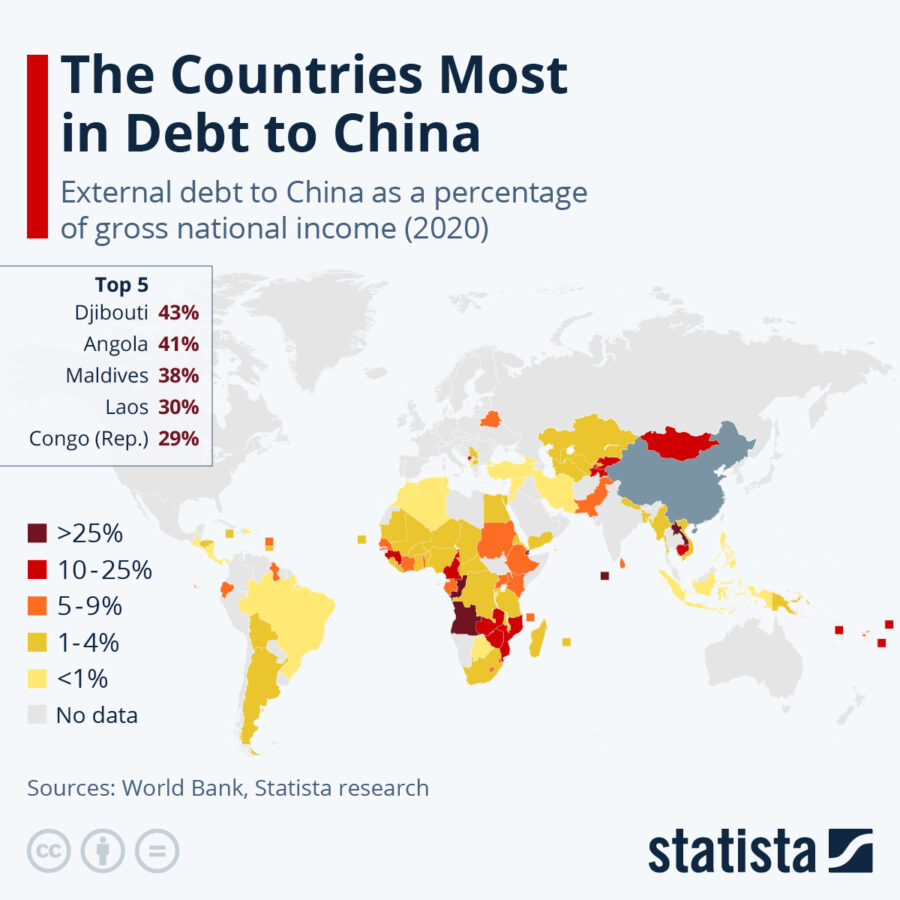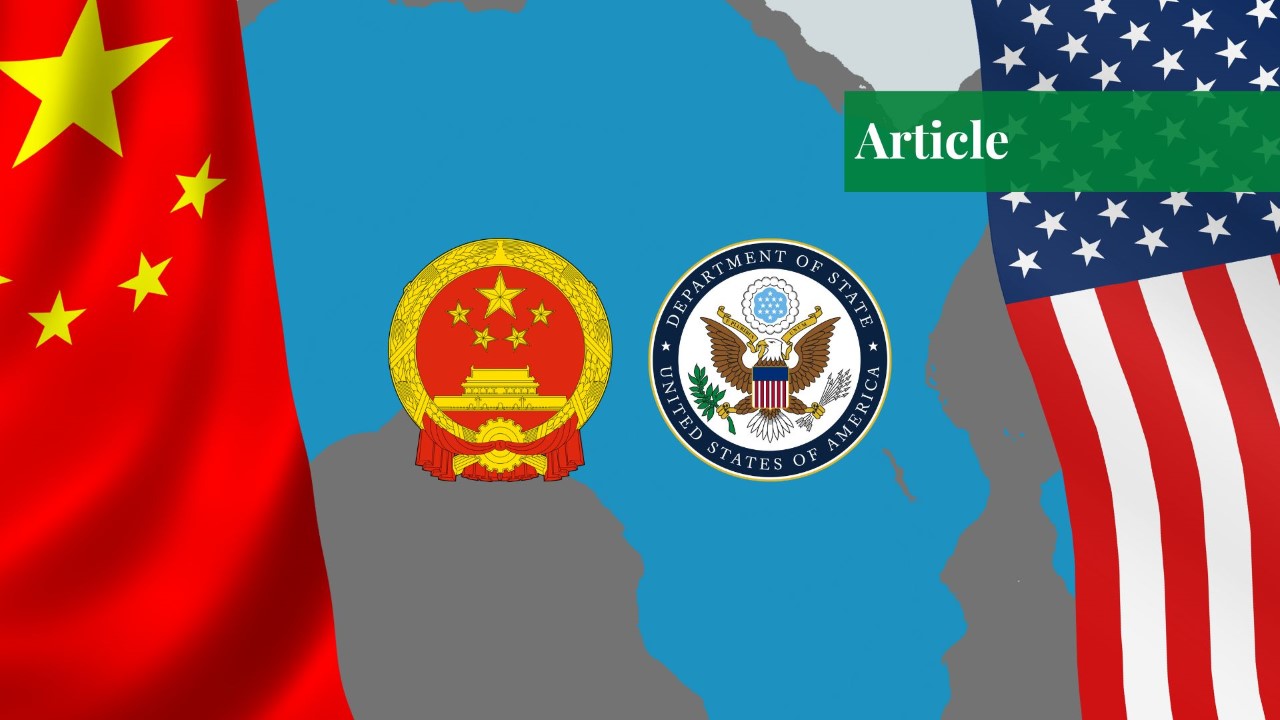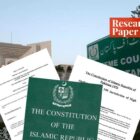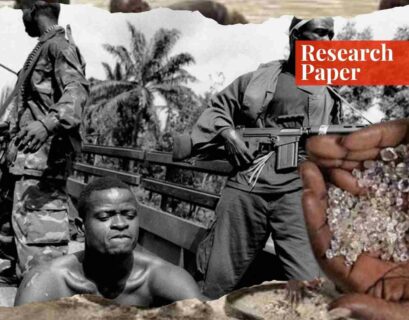Henri is an economist and contributor to Nkafu policy, a think tank. Before this, he was an economist and macroeconomic strategist at Roubini Global Economics, one of the leading economic research providers in London.
Introduction
Chinese lending in Africa slowed following the COVID-19 pandemic. However, it still remains the single largest bilateral lender in Africa, beset by a range of problems ranging from a ballooning youth population, inadequate infrastructure, unsustainable debt levels, and commodity-reliant growth.
Africa’s total debt burden is estimated at $696 billion, with China holding most of its debt. A toxic cocktail consisting of the COVID-19 pandemic, Russia’s war in Ukraine, rising food prices, debt sustainability concerns, falling tax revenues, and rising interest costs have caused a rethink of Africa’s debt trajectory. This has raised concerns of debt-trap diplomacy – that are premature – as poor governance is the leading cause of Africa’s debt trap.
Western countries have sought to provide alternatives to Chinese financing to redress the balance across Africa, leveraging traditional multilateral institutions and accelerating bilateral relations away from aid towards investment.
President Macron reiterated the need for a new partnership contingent on private sector investment, mutual interest, and African autonomy. This approach underscores the urgency of balancing the debt scales across the continent and preventing a unilateral takeover by the Chinese. Such attempts may prove futile if Western countries do not sustainably place Africa’s debt sustainability before its investment needs.
A Quarter of African Countries are at Risk of Debt Distress
Africa’s debt is estimated at a staggering $696 billion, and public debt has doubled since 2010, reaching 65% of the Gross Domestic Product (GDP). As China’s loans have contributed to a boom in infrastructure financing, loans peaked at $28.4 billion in 2016 before falling to $8.2 billion and 1.9 billion in 2019 and 2020 respectively.

Chinese private sector debt in Africa is estimated at $20.9 billion, while bilateral loans have reached $63.2 billion, dwarfing France (14 billion), Saudi Arabia (12 billion), Germany ($10 billion), and Japan ($8.9 billion).
Debt Servicing Costs are Rising
As debt levels have risen, so have debt servicing costs. According to the World Bank, debt servicing costs for private, bilateral, and multilateral donors are estimated at $38 billion, $5.5 billion, and $14 billion respectively. As much of this debt is denominated in dollars, weaker currencies, interest rate hikes in advanced economies, and ballooning deficits have caused interest payments to become increasingly untenable, consuming ever-rising portions of government spending.
The portion of government spending that is used to service Africa’s debt has risen from 3.6% in 2009 to 9.2% in 2022. As of November 2022, the IMF and World Bank found that 22 African countries are either in debt distress or at high risk of debt distress. One cannot ignore the scale of Chinese debt, estimated at over $81 billion, closer to the World Bank – International Development Assistance’s loan of $84.1 billion.
Chinese private and bilateral loans dwarf the African Development Bank ($43.1 billion), World Bank – International Bank for Reconstruction and Development ($30.9 billion), and the European Investment Bank ($10.9 billion). As such, it is naive to ignore China’s role in supporting Africa’s debt sustainability.
Africa’s Debt
As Africa has become indebted following its entrenchment into the Chinese Belt and Road Initiative, several pundits have cautioned against the potential for debt-trap diplomacy. China owns about 67% of the total bilateral official credit covered by the G20 Debt Service Suspension Initiative (DSSI), 17% of commercial bank credit, and only a tiny portion of the sovereign bonds.
China’s substantial exposure to Africa and its role as a rising geopolitical power and central role in economic governance make it well-placed to support Africa’s deleveraging. During the COVID-19 pandemic, the G20 suspended $12.9 billion of African debt, and China was the largest giver of debt suspension relief under the DSSI at $5.7 billion, over half of the total amount.
Countries like Angola could suspend $1 billion of interest and principal payments between 2020-2022. Meanwhile, commercial banks such as the Export-Import Bank had $110 million of Zambia’s debt in 2020, which underscores why concerns about asset appropriation and debt-trap diplomacy may be overstated.
The G20 DSSI was accompanied by the International Monetary Fund’s $650 billion Special Drawing Rights (SDR) allocation that was not repeated in 2022. The COVID-19 pandemic revealed that China is indispensable to addressing Africa’s debt, and this must be separated from its broader geostrategic competition with the United States. However, the DSSI initiative only suspended rather than canceled debt.
Working Out a Framework
The DSSI has been successful. Less successful is the G20 Common Framework for Debt Treatments beyond the DSSI (Common Framework). Only three countries have signed up to the Common Framework – Chad, Ethiopia, and Zambia – hoping to access new funding from this scheme.
Meanwhile, China and other partners should be included in the debt sustainability analysis for African countries. At the same time, creditors should work with African governments to provide a road map to improve their credit ratings once they engage in debt suspension initiatives. Meanwhile, dialogue should be structured to achieve better consensus between China, the West, and African nations.
Dialogue should be structured around three broad pillars: addressing long-term debt issues; multilateral cooperation; and US-China rivalry.
Addressing Long-Term Debt Issues
All lenders and governments should be transparent about lending terms. Secondly, the common framework for debt treatment should be strengthened to ensure more African countries can benefit from it. The Paris Club Framework for debt treatments can be used as a roadmap for other multilateral initiatives designed to suspend or cancel African debt. At the same time, private creditors must be included during negotiations.
Multilateral Cooperation
The G7 and G20 should be used to think about quantifiable targets regarding Africa’s investment needs. This will allow countries to openly disclose what projects they intend to finance and enable multilateral institutions to plug the gap in funding. Furthermore, this should only occur when there is a clear road map to address currently unsustainable debt levels.
The World Bank and IMF should ensure that China is included in debt calculations and negotiations while pressing for a common rule book to guide DSSI initiatives between governments and private creditors.
US-China Rivalry
US-China rivalry must be separated from Africa’s debt and investment needs. It is essential that policymakers avoid baseless narratives and instead advance the geostrategic positions across the continent whilst remaining cognizant of Africans. This requires that Africans are included early on in the conversation to ensure the process remains inclusive rather than become usurped in the broader geostrategic competition.
Conclusion
Africa’s debt requires a new type of multilateralism that acknowledges state rivalry while leveraging avenues for cooperation. Rather than overemphasize investment across the continent, policymakers should ensure there are clear roadmaps to exit current unsustainable debt levels, improve credit ratings and facilitate access to international debt markets for African countries. Investing without addressing the current debt issues could be politically costly for China, especially the West.
If you want to submit your articles, research papers, and book reviews, please check the Submissions page.
The views and opinions expressed in this article/paper are the author’s own and do not necessarily reflect the editorial position of Paradigm Shift.



















